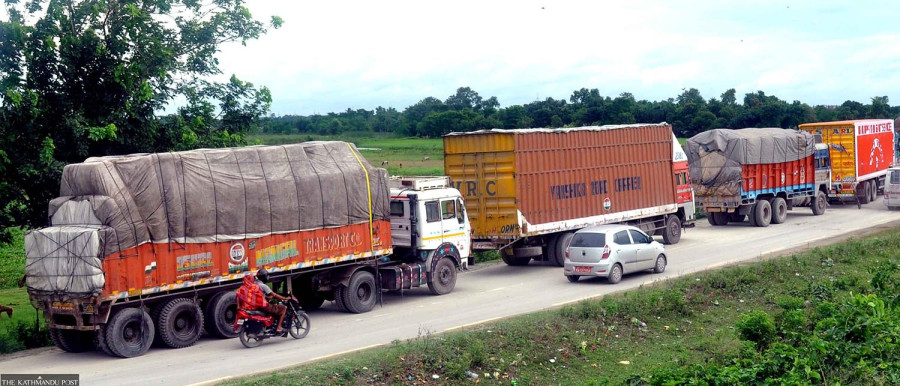Editorial
No drastic measures
Politicians need to get their heads out of the sand and start thinking constructively.
The growing economic crisis has precipitated various measures from various quarters to prop up the weakening economy. The current call has been to curtail burgeoning imports that are exerting pressure on the depleting foreign exchange reserves. According to the Department of Customs, Nepal's import bill for the first half of the current fiscal year 2021-22 stood at Rs999.34 billion, a rise of 51.13 percent year-on-year. One of the reasons for the increase is the rising cost of goods being imported into Nepal. With global prices soaring, it has directly impacted imports entering Nepal. The outgoings to pay for the imports have virtually doubled from one year to the next primarily due to this reason.
In a bid to reduce imports, amid a series of measures, the Association of Nepalese Rice, Oil and Pulses Industry has urged the Ministry of Finance and its related departments to provide export incentives to exporters of these products by imposing heavy import duties on rice and lentils of up to 15 and 20 percent. However meaningful it seems, such a measure is unlikely to dent the consumers' insatiable demand for imported produce, at least in the short run. This recommendation comes on the heels of the government's banning imports of luxury items with a particular focus on motor vehicles.
For a country made to depend on imports following a systematic decimation of a few industries that thrived, the myopic vision of policymakers has now led to a hawkish proposal that is bound to have a knock-on effect on sectors that depend so much on it. It may be argued that banning imports is necessary to stem the flow of depleting foreign exchange reserves. But the policymakers cannot be forgiven for their oversight of a long-anticipated problem. Knee-jerk reactions like banning imports of essentials will exacerbate the current economic situation, leading to economic stagnation.
In looking for drastic measures, the government intends to shoot itself in the foot through extreme import policies. Perhaps the solution to the problem lies elsewhere. Maybe the policymakers should concentrate their efforts on attracting foreign direct investment and cultivating an atmosphere conducive for businesses to operate and run free from the widespread rigid bureaucracy. It is about time that the government followed up on a proper plan to develop both the manufacturing and the agricultural sectors that will attract the scores of youths that have ventured overseas in search of a better future.
The results of constructive measures do not happen overnight—they need thorough planning and careful implementation. If politicians are concerned about the current crisis, turning the corner will not be challenging. It's not all doom and gloom for Nepal, but politicians need to get their heads out of the sand and start thinking constructively. Albert Einstein aptly put it, "In the midst of every crisis lies great opportunity." And perhaps this is our moment to turn this difficult phase into a flourishing opportunity and work it to our advantage.




 18.12°C Kathmandu
18.12°C Kathmandu














